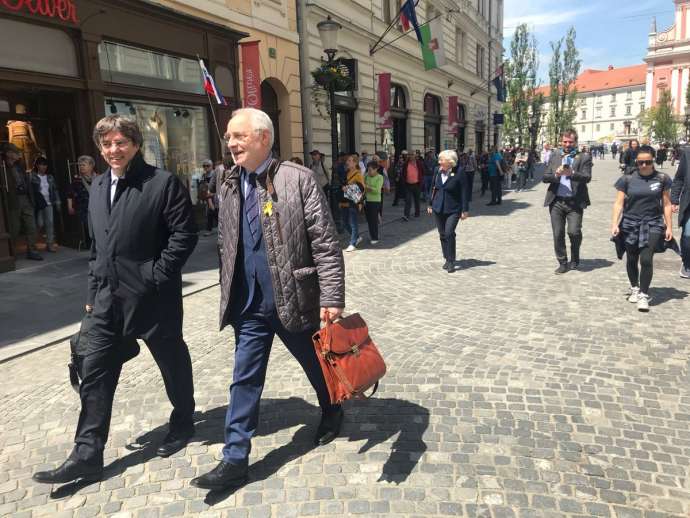STA, 10 May 2019 - Former Catalan President Carles Puigdemont, who was invited to Slovenia by former Slovenian President Milan Kučan and MEP Ivo Vajgl (Alde/DeSUS), said in Ljubljana on Friday that the aim of the Catalan independence movement was to strengthen democracy at the Catalan and EU level.
Puigdemont and two former Catalan councillors have chosen Ljubljana as one of the first destinations for their EU election campaign since according to them Slovenia is Catalonia's friend and serves as an inspiration, demonstrating that small countries and democratic values can thrive in Europe.
Arribat a #Eslovènia. Després de la reunió amb l'alcalde de #Ljubljana, Zoran Janković, a les 14h podeu seguir en directe l'acte amb els eurodiputats @ivajgl i @isoltesEP, i els consellers @toni_comin i @ClaraPonsati
— Carles Puigdemont (@KRLS) May 10, 2019
? Directe: https://t.co/CEQFohdPwD#JuntsxEuropa ?#EP2019 pic.twitter.com/btuihmDIVo
During a debate at the City Museum, Puigdemont pointed out that while some proponents of Catalonia's independence were imprisoned or exiled, the movement's aim was "to strengthen our democracy and ensure better service to our citizens".
"Without democracy, there'd be no future, without democracy, small countries, such as Slovenia, would be threatened by large ones," said the former president.
Among the main goals of the movement he listed peace, freedom, human rights, social progress and the fight against climate change.
According to him, the supporters of the Catalan independence will strive for these goals in the EU Parliament as well.
"We hope we will cooperate with other MEPs, including Slovenian ones, to advance efforts regarding democracy and self-determination," said Clara Ponsati, an MEP candidate and former Catalan Councillor of Education.
We are fighting for Europe, not only for ourselves. The #1oct referendum is our way to contribute to the future of Europe. We want to be another of the small nations that help to improve Europe and the world https://t.co/D9hVKgo3YK#JuntsxEuropa ?#EP2019 pic.twitter.com/XCClZpLRS1
— Carles Puigdemont (@KRLS) May 10, 2019
She pointed out that if Puigdemont was elected to the Parliament, the Catalans would have a voice in the centre of EU institutions, which would be a very important step forward for them, enabling them to express themselves and assigning the institutions the responsibility for Catalan democracy as well.
Puigdemont, Ponsati and former Catalan Councillor of Health Antoni Comin will be running for a seat in the EU Parliament on the joint slate Together for Europe, featuring several Catalan parties, including Puigdemont's Together for Catalonia.
The Spanish Electoral Commission had banned their candidacy, but the Madrid Administrative Court annulled this decision on Monday.
The former Catalan president commented on the results of the recent Spanish parliamentary election, won by Prime Minister Pedro Sánchez's Socialist party (PSOE), saying that the party got fewer votes this time, same as one of the other central parties, the conservative People's Party.
Puigdemont thus believes that the Spanish political core is weaker, which poses a risk to the system's stability.
"I think now is the moment for a coalition government, otherwise the instability will continue and there will not be enough political power or majority to start seriously tackling the Catalan crisis," he said.
The only way to start resolving the crisis is to open up political dialogue, according to him.
Puigdemont was one of the main initiators of the Catalan independence referendum, held on 1 October 2017, with the Catalan regional parliament passing the resolution declaring independence that month as well.
The action was declared illegal by Spain, with the Spanish authorities deposing Puigdemont as well as his government and imposing a direct rule over Catalonia. The demoted president and a number of his former ministers fled for Belgium, facing rebellion charges.
Unlike twelve former Catalan leaders who stayed in Spain, Puigdemont is not being prosecuted in Spain even though he has been charged with rebellion. The prosecuted dozen are facing 7 to 25 years in prison.







